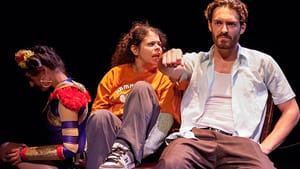Stay in the Loop
BSR publishes on a weekly schedule, with an email newsletter every Wednesday and Thursday morning. There’s no paywall, and subscribing is always free.
If a whore screams does she make a sound?
'Lulu’s Golden Shoes' by Quiara Alegría Hudes

In Quiara Alegría Hudes’s play Lulu’s Golden Shoes, main character Ana (Rachel O’Hanlon-Rodriguez) is growing up. She calls herself “Barrio Grrrl” and imagines herself being accepted to Yale (“Not jail, Abuela”) and winning the Miss Nuyorican USA crown. But she’s really a young girl dealing with body issues, menstruation, and what it means to be a woman coming of age in the barrio.
Her mother, Mary (Anita Holland), once the most popular psychic on the block, tries to keep her safe with stinky herbal baths. Neighbor Rosie Lulu (Jennifer Nikki Kidwell), the Lulu of the golden shoes, and Ana’s best friend, the Amazing Voice (Leah Walton), an imaginary superhero figure dressed Wonder Woman-style in purple spandex and high boots with a tiara of flowers and a belt of what looks like hair curlers, challenge Ana to explore her own needs and desires.
Hudes, whose play Water by the Spoonful and musical In the Heights have won the Pulitzer Prize and Tony Awards, is revisiting familiar territory. She wrote about Ana and the Amazing Voice in the 2009 family musical Barrio Grrrl! Now a few years older, Ana tries to understand who she is in a world that seems to have no safe place for women.
Water and tradition
The themes of water and tradition — the ritual baths, the river beneath the city where the women go to pee their stories — that Hudes has used in her other works play a part here. Ana calls out “orange juice” in her sleep and cuts onions to make her eyes tear so she can feel, while mother Mary puts on a wig and her own golden shoes to please the ex who abused and abandoned her. When Lulu disappears, Ana wants to find out what happened to her. She also wants to try on those golden shoes.
Meanwhile, the Alchemists (Davey Stratten White and Chris Anthony) patrol the streets trying to wipe out whoredom, hoping to turn dross matter into gold, but instead find out, as Lulu warns them, “All beauty turns ugly.”
Seeing this play, which, the Amazing Voice tells us, is “the 12th episode of the amazing adventures of Barrio Grrrl,” makes me wish I had seen the original Barrio Grrrl! to help me understand Ana’s journey — the story, fascinating as it is, lacks a central core. What does this Barrio Grrrl want? What’s she prepared to do?
She’s an observer of the life around her, not a catalyst for changing it. There is occasional wit and humor in the script, as when Ana and Lulu swap insults for fat girls (sausage lips, filet of fat) and whores. But it is also a bit heavy-handed. The Alchemists make pronouncements about society, but what they say is hard to follow.
Friends, real and imaginary
The performances are mixed. O’Hanlon-Rodriguez portrays a young girl, feisty one moment, romantic and insecure the next. She is someone to care about. Holland seems more at home as the flirtatious wife than the concerned mother, and Kidwell has moments of sass that bring her character to life. The Alchemists/random males are stylized concepts of men and bureaucracy, easy to dislike, which means they have played their parts well.
The character that is most puzzling is Walton as the Amazing Voice, more because of the concept of the character than the performance. Imaginary friends keep us company when we’re lonely, listen to us when no one else will, sometimes even challenge us to do things we might not want to. But Amazing Voice seems more a narrator of Ana’s story than a participant in it. Is Amazing Voice a sidekick to Barrio Grrrl or an alter ego? Why this version of an imaginary friend? Is Ana’s only vision of strength taken from a comic book heroine who doesn’t share her culture?
The set, designed by Thom Weaver, is many layered. Windows look down on houses marked out in tape, ladders lead up and away to a mysterious unknown, props — clothing, a tiara, a pine tree car deodorizer — drop from the ceiling. A bed and chairs appear and leave.
The play resonates, which is good, but it leaves me with many questions. Are these women the only models of womanhood Ana can choose from? Who is Barrio Grrrl, and what does she stand for? What is whoredom anyway? Does it need to be eradicated? Does a whore really have a heart of gold? Is she someone to be admired? Emulated? Are all women essentially whores?
Hudes clearly has much to say about women’s roles in the barrio. I left the theater wishing I had understood it better. Or perhaps, I just prefer an ending that gives me something to hope for.
What, When, Where
Lulu’s Golden Shoes. By Quiara Alegría Hudes; Brenna Geffers directed. Flashpoint Theatre Company production through August 2, 2015 at the Caplan Studio Theatre, 211 S. Broad St., 16th Floor, Philadelphia. 267-997-3312 or flashpointtheatre.org.
Sign up for our newsletter
All of the week's new articles, all in one place. Sign up for the free weekly BSR newsletters, and don't miss a conversation.

 Naomi Orwin
Naomi Orwin